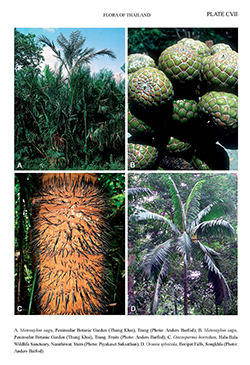e-Flora of Thailand
Volume 11 > Part 3 > Year 2013 > Page 461 > Arecaceae > Orania
Orania sylvicola (Griff.) H.E.Moorewfo-0000258670
Principes 6: 44. 1962.— Macrocladus sylvicola Griff., Calcutta J. Nat. Hist. 5: 490. 1845. Plate CVII: D.
Accepted Name : This is currently accepted.
Synonyms & Citations :
Description : Solitary palm to 20 m tall. Crown rounded in outline, with 15–20 leaves. Leaf sheath 30–50 cm long; petiole 30–110 cm long; rachis 2.5–3.5 m long, straight to slightly curved distally; pinnae 60–75 per side, longest ones in the middle, 80–100 cm long. Inflorescence with 30–60 cm long peduncle; first order branches 20–30, up to 30 cm long proximally; rachillae numerous 20–25 cm long, spreading to eventually drooping at fruit maturity. Fruits globose or 2–3 lobed, 3.5–4.5 cm diam., yellow at maturity.
Thailand : PENINSULAR: Krabi, Phatthalung, Trang, Satun.
Distribution : Peninsular Malaysia (type), W Borneo, Sumatra, Java.
Ecology : Slopes in lowland evergreen forests.
Vernacular : Mak phon (หมากพน)(Peninsular); li boi (ลีบอย)(Peninsular).
Uses: Ornamental.
Conservation Status: Most likely threatened by habitat degradation.
Notes: The combination of large habit and praemorse leafl ets that are white underneath is found in no other reduplicately pinnate-leaved palm in Thailand. From a distance the palm is reminiscent of a Coconut palm.

